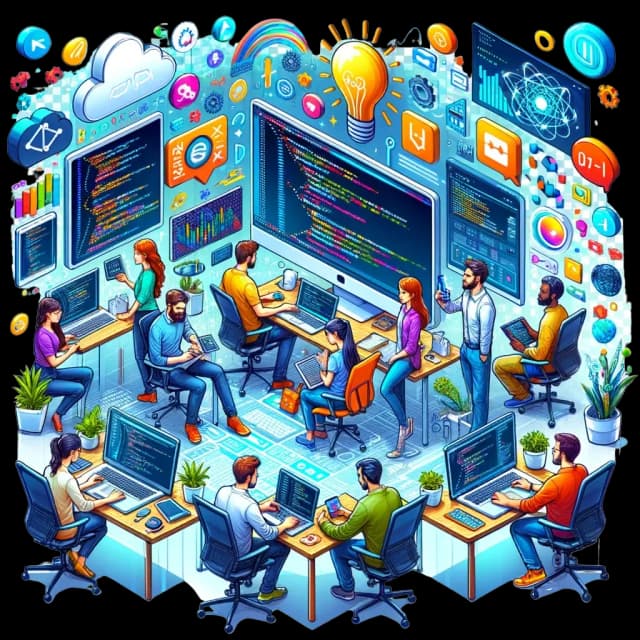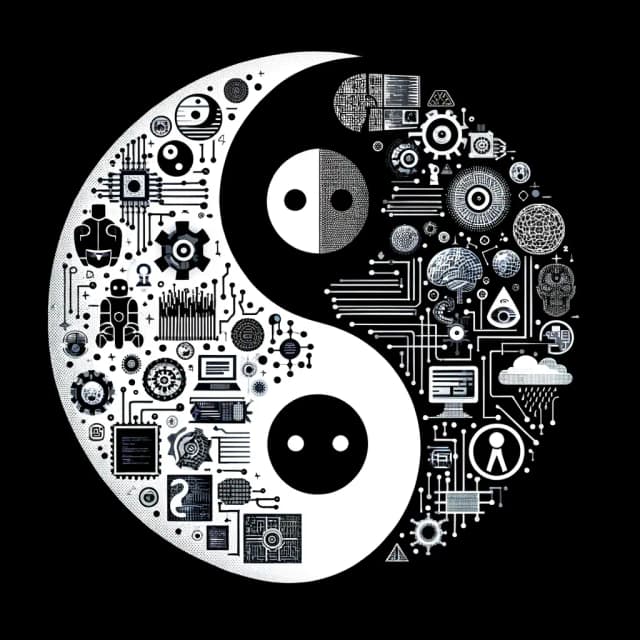What is artificial intelligence (AI)?
Artificial Intelligence (AI) is the development of computer systems that can perform tasks requiring human intelligence. Examples are understanding language, recognizing images, and solving problems.
Artificial Intelligence is often used interchangeably with machine learning (ML) and deep learning. But AI is a field, and ML and Deep Learning are its fields.

How does AI work?
Artificial Intelligence (AI) operates by processing vast datasets, identifying patterns and correlations within data, and utilizing these insights to predict future outcomes.
For instance, an image recognition tool can accurately identify and describe objects in images after analyzing millions of examples. Additionally, advancements in generative AI technologies now enable the creation of authentic text, images, music, and various forms of media.
What are examples of AI technology, and how is it used today?
Artificial Intelligence (AI) is revolutionizing various sectors with its capability to automate and enhance processes. Below are seven pivotal AI technologies and their applications:
Automation and RPA: AI elevates automation, enabling software to perform repetitive data tasks with increased speed and accuracy. By integrating AI, automation software can handle more complex jobs, adapt to changes, and facilitate smarter decision-making in enterprises.
Machine Learning (ML): ML empowers computers to learn and make decisions without explicit programming. It includes deep learning for advanced predictive analytics. ML is categorized into:
Supervised learning for pattern recognition in labeled data.
Unsupervised learning for sorting unlabeled data based on similarities or differences.
Reinforcement learning is where AI learns through feedback after actions.
Machine Vision: Surpassing human sight, machine vision systems analyze visual data for applications ranging from signature verification to medical imaging, offering capabilities like seeing beyond walls.
Natural Language Processing (NLP): NLP allows computers to understand human language for tasks such as spam detection, text translation, sentiment analysis, and speech recognition, enhancing communication and information processing.
Robotics: Robots, designed to perform tasks challenging for humans, are transforming industries from manufacturing to space exploration, with AI-driven robots now learning to interact socially.
Self-driving Cars: Combining computer vision, image recognition, and deep learning, autonomous vehicles navigate roads, stay within lanes, and avoid obstacles, showcasing AI's potential in transportation.
Generative AI: This technology crafts new content, from realistic images to textual responses, leveraging text prompts to generate diverse media, including art, emails, and screenplays, demonstrating AI's creativity.

What are the applications of AI?
Artificial Intelligence (AI) transforms industries by offering innovative solutions to complex challenges. Here are key areas where AI is making a significant impact:
Healthcare: AI enhances patient outcomes and reduces costs through applications like IBM Watson, which assists in making faster medical diagnoses. Virtual health assistants and chatbots streamline patient interactions, from scheduling appointments to offering medical advice.
Business: AI-driven machine learning algorithms improve customer service through analytics and CRM platforms. Chatbots and generative AI technologies like ChatGPT are reshaping customer interactions, product design, and business models.
Education: AI automates grading and personalizes learning, allowing students to progress at their own pace. AI tutors support students, while generative AI tools assist educators in creating coursework.
Finance: AI applications like Intuit Mint offer personalized financial advice, while AI algorithms play a significant role in trading and investment strategies on Wall Street.
Law: AI streamlines the legal industry by automating document analysis and enhancing client service through predictive analytics and information extraction.
Entertainment and Media: AI optimizes targeted advertising, content recommendation, and automates routine tasks in newsrooms, including content generation and data analysis.
Software and IT: Generative AI tools are emerging to generate application code, while AI automates IT processes such as data entry, enhancing efficiency and threat detection.
Security: AI improves cybersecurity through anomaly detection and threat analytics and enhances the accuracy of threat detection systems.
Manufacturing: AI-enabled robots, or cobots, collaborate with humans in manufacturing processes, increasing efficiency and productivity on factory floors.
Transportation: AI plays a crucial role in autonomous vehicles, traffic management, and improving the efficiency and safety of shipping and supply chains, especially highlighted during the COVID-19 pandemic.



